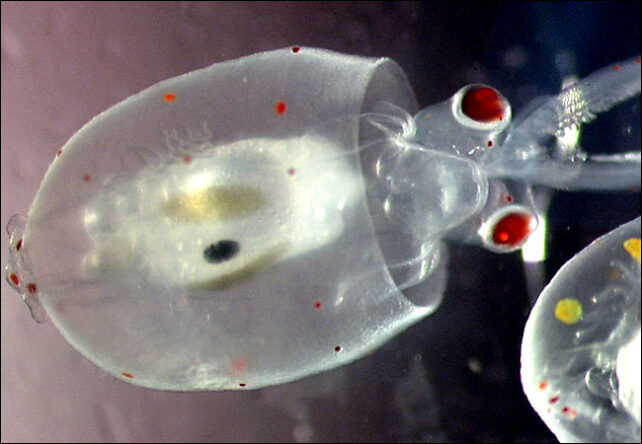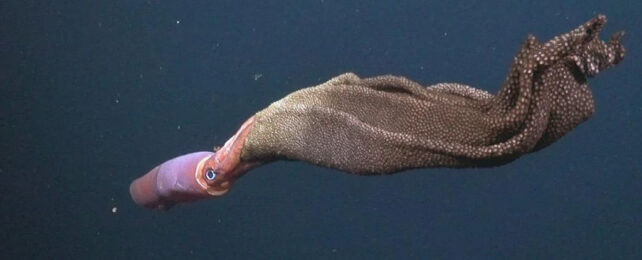Mesmerizing footage captures the incredible mom powers of a black-eyed squid as she hauls thousands of eggs through the ocean, for many months, not once letting go. Not even to feed.
"Brooding squid cannot swim very quickly, and may be easy prey for deep-diving marine mammals," explains the Schmidt Ocean Institute who captured the rare footage off the coast of Costa Rica, during their recent OctoOdyssey dive.
Unlike most squids, Gonatus onyx, with its distinct big, white-rimmed black eyes, is one of only two known species to take care of their eggs once spawned. And the price is likely very high.
The mother clings to around 2,000 to 3,000 eggs enveloped in a tube-shaped membrane that opens at both ends, gently extending and retracting her arms to flush the low-oxygen-bearing water through the tubular egg mass.
The eggs' development period is estimated to be between 6 to 9 months – an awfully long time for mama to go without food.
Early on, when encountering threats, the squid can haul her eggs quickly to safety but as the eggs mature, she weakens, so her ability to safely flee danger with all her young becomes increasingly compromised.
"Aggressive arm movements and escape swimming caused partial disintegration of the more mature egg masses and hatching of the released eggs," University of South Florida marine biologist Brad Seibel and colleagues reported in their 2005 paper documenting the animals' responses to the submersible.
"Those with advanced embryos showed only respiratory mantle contractions and did not move away."
Researchers have also observed gradual declines in muscle and digestive-gland condition in Gonatid squids, suggesting they do indeed rely on their energy stores during a long egg-brooding period.
Squids usually only reproduce once, usually dying soon after laying their eggs, so surviving long enough to see the young hatch will be this mama's final act, if she doesn't die trying to protect them first.

Black-eyed squids are one of the most common cephalopods dwelling in the Pacific coasts from from Japan to California, and as far north as the Bering Sea. While their young hunt shallow coastal waters in packs, the up to 18-centimeter-long (7-inch) adults prefer deeper waters, and move into the permanent darkness of even deeper waters while vulnerably brooding their eggs.
Here they are still within range of diving mammals such as whales and elephant seals. Their life-stage migrations contribute to the movement of organic matter from shallow waters to deeper ocean biomes.
